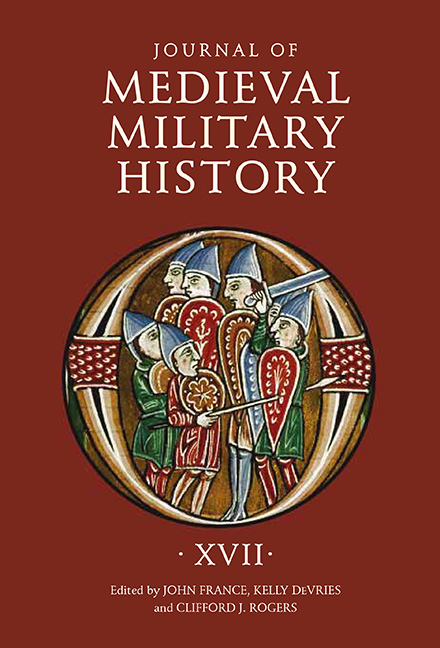Book contents
- Frontmatter
- Contents
- List of Illustrations
- 1 Baktash the Forgotten: The Battle of Tell Bashir (1108) and the Saljuq Civil Wars
- 2 The External Fortifications of ʿAtlit Castle, the Only Unconquered Crusader Stronghold in the Holy Land
- 3 Holy Warriors, Worldly War: Military Religious Orders and Secular Conflict
- 4 Elionor of Sicily: A Mediterranean Queen’s Two Lives of Family, Administration, Diplomacy, and War
- 5 Wives, Mistresses, Lovers, and Daughters: The Fortunes of War for Royal Women in Late Fourteenth Century Castile. OR: A Gender Limitation on Writing History from Chronicles
- 6 The Lance in the Fifteenth Century: How French Cavalry Overcame the English Defensive System in the Latter Part of the Hundred Years War
- 7 Supplying the Army, 1498: The Florentine Campaign in the Pisan Countryside
- 8 Fencing, Martial Sport, and Urban Culture in Early Modern Germany: The Case of Strasbourg
- 9 Note: An Army on the March and in Camp – Guillaume Guiart’s Branche des royaus lingnages
- List of Contributors
- Journal of Medieval Military History 1477–545X
5 - Wives, Mistresses, Lovers, and Daughters: The Fortunes of War for Royal Women in Late Fourteenth Century Castile. OR: A Gender Limitation on Writing History from Chronicles
Published online by Cambridge University Press: 12 June 2021
- Frontmatter
- Contents
- List of Illustrations
- 1 Baktash the Forgotten: The Battle of Tell Bashir (1108) and the Saljuq Civil Wars
- 2 The External Fortifications of ʿAtlit Castle, the Only Unconquered Crusader Stronghold in the Holy Land
- 3 Holy Warriors, Worldly War: Military Religious Orders and Secular Conflict
- 4 Elionor of Sicily: A Mediterranean Queen’s Two Lives of Family, Administration, Diplomacy, and War
- 5 Wives, Mistresses, Lovers, and Daughters: The Fortunes of War for Royal Women in Late Fourteenth Century Castile. OR: A Gender Limitation on Writing History from Chronicles
- 6 The Lance in the Fifteenth Century: How French Cavalry Overcame the English Defensive System in the Latter Part of the Hundred Years War
- 7 Supplying the Army, 1498: The Florentine Campaign in the Pisan Countryside
- 8 Fencing, Martial Sport, and Urban Culture in Early Modern Germany: The Case of Strasbourg
- 9 Note: An Army on the March and in Camp – Guillaume Guiart’s Branche des royaus lingnages
- List of Contributors
- Journal of Medieval Military History 1477–545X
Summary
This article first shows what can be learned about Castilian royal women in the latter half of the fourteenth century through the use of existing chronicle accounts, then argues that a gender bias characteristic of such sources is a significant factor in limiting what scholars can discover about the roles of even elite female figures during this highly eventful period in the kingdom's history. Finally, the article explores what may be called the “source problem” inherent in researching and writing about late medieval Castile: the paucity of surviving documents, something that forces an over-reliance upon the chronicles. This relative absence of documentation stands in stark contrast to the situation scholars encounter in Castile's eastern neighbor, the Crown of Aragon, where careful preservation of documents, in particular state papers, got underway several centuries earlier than in Castile. This article was written in conjunction with the one by Don Kagay that immediately precedes it in this issue of the JMMH, an article that demonstrates what can be accomplished in portraying the life of a royal woman of the period when archival sources are available to flesh out the portrait.
During the latter half of the fourteenth century, a new royal dynasty, the House of Trastámara, established itself in the central Iberian kingdom of Castile, largest of five states that occupied the peninsula. Early in the following century, one branch of that dynasty also came to power in the neighboring Crown of Aragon, a political conglomerate that included the kingdoms of Aragon and Valencia, the county of Catalonia, and the Balearic Islands as well as a small slice of southern France stretching along the Mediterranean coast. The establishment of this family in the two most important Iberian polities set the stage for their eventual unification, one that was accomplished through a famous marriage in 1469 of two cousins, Ferdinand of Aragon (r. 1474–1516) and Isabel of Castile (r. 1474–1504).3 From that marriage sprang a Spanish state that would soon incorporate all of Iberia with the exception of Portugal and would become by around 1500 the most powerful kingdom in early modern Europe.
The period in Castilian history that witnessed both the birth and coming of age of the Trastámaran dynasty was one of extensive conflict, a period of roughly four decades (1350–1387) torn by warfare, both foreign and domestic.
- Type
- Chapter
- Information
- Journal of Medieval Military HistoryVolume XVII, pp. 103 - 140Publisher: Boydell & BrewerPrint publication year: 2019



